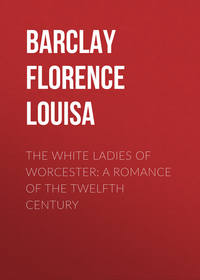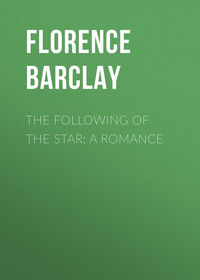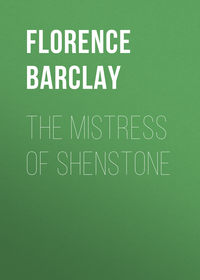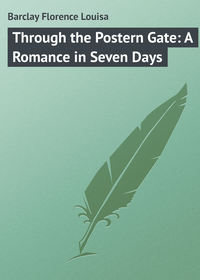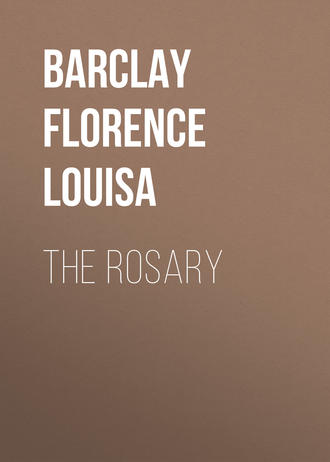 полная версия
полная версияThe Rosary
The sun-dial pointed to seven o'clock. The rooks had circled round the elms and dropped contentedly into their nests.
"Let us go in," said Jane, rising. "I am glad we have had this talk," she added, as he walked beside her across the lawn.
"Yes," said Garth. "Air-balls weren't in it! It was a football this time—good solid leather. And we each kicked one goal,—a tie, you know. For your advice went home to me, and I think my reply showed you the true lie of things; eh, Miss Champion?"
He was feeling seven again; but Jane saw him now through old Margery's glasses, and it did not annoy her.
"Yes," she said, smiling at him with her kind, true eyes; "we will consider it a tie, and surely it will prove a tie to our friendship. Thank you, Dal, for all you have told me."
Arrived in her room, Jane found she had half an hour to spare before dressing. She took out her diary. Her conversation with Garth Dalmain seemed worth recording, particularly his story of the preacher whose beauty of soul redeemed the ugliness of his body. She wrote it down verbatim.
Then she rang for her maid, and dressed for dinner, and the concert which should follow.
CHAPTER VI
THE VEIL IS LIFTED
"MISS CHAMPION! Oh, here you are! Your turn next, please. The last item of the local programme is in course of performance, after which the duchess explains Velma's laryngitis—let us hope she will not call it 'appendicitis'—and then I usher you up. Are you ready?"
Garth Dalmain, as master of ceremonies, had sought Jane Champion on the terrace, and stood before her in the soft light of the hanging Chinese lanterns. The crimson rambler in his button-hole, and his red silk socks, which matched it, lent an artistic touch of colour to the conventional black and white of his evening clothes.
Jane looked up from the comfortable depths of her wicker chair; then smiled at his anxious face.
"I am ready," she said, and rising, walked beside him. "Has it gone well?" she asked. "Is it a good audience?"
"Packed," replied Garth, "and the duchess has enjoyed herself. It has been funnier than usual. But now comes the event of the evening. I say, where is your score?"
"Thanks," said Jane. "I shall play it from memory. It obviates the bother of turning over."
They passed into the concert-room and stood behind screens and a curtain, close to the half-dozen steps leading, from the side, up on to the platform.
"Oh, hark to the duchess!" whispered Garth. "My NIECE, JANE CHAMPION, HAS KINDLY CONSENTED TO STEP INTO THE BREACH—' Which means that you will have to step up on to that platform in another half-minute. Really it would be kinder to you if she said less about Velma. But never mind; they are prepared to like anything. There! APPENDICITIS! I told you so. Poor Madame Velma! Let us hope it won't get into the local papers. Oh, goodness! She is going to enlarge on new-fangled diseases. Well, it gives us a moment's breathing space.... I say, Miss Champion, I was chaffing this afternoon about sharps and flats. I can play that accompaniment for you if you like. No? Well, just as you think best. But remember, it takes a lot of voice to make much effect in this concert-room, and the place is crowded. Now—the duchess has done. Come on. Mind the bottom step. Hang it all! How dark it is behind this curtain!"
Garth gave her his hand, and Jane mounted the steps and passed into view of the large audience assembled in the Overdene concert-room. Her tall figure seemed taller than usual as she walked alone across the rather high platform. She wore a black evening gown of soft material, with old lace at her bosom and one string of pearls round her neck. When she appeared, the audience gazed at her and applauded doubtfully. Velma's name on the programme had raised great expectations; and here was Miss Champion, who certainly played very nicely, but was not supposed to be able to sing, volunteering to sing Velma's song. A more kindly audience would have cheered her to the echo, voicing its generous appreciation of her effort, and sanguine expectation of her success. This audience expressed its astonishment, in the dubiousness of its faint applause.
Jane smiled at them good-naturedly; sat down at the piano, a Bechstein grand; glanced at the festoons of white roses and the cross of crimson ramblers; then, without further preliminaries, struck the opening chord and commenced to sing.
The deep, perfect voice thrilled through the room.
A sudden breathless hush fell upon the audience.
Each syllable penetrated the silence, borne on a tone so tender and so amazingly sweet, that casual hearts stood still and marvelled at their own emotion; and those who felt deeply already, responded with a yet deeper thrill to the magic of that music.
"The hours I spent with thee, dear heart, Are as a string of pearls to me;I count them over, ev'ry one apart, My rosary,—my rosary."Softly, thoughtfully, tenderly, the last two words were breathed into the silence, holding a world of reminiscence—a large-hearted woman's faithful remembrance of tender moments in the past.
The listening crowd held its breath. This was not a song. This was the throbbing of a heart; and it throbbed in tones of such sweetness, that tears started unbidden.
Then the voice, which had rendered the opening lines so quietly, rose in a rapid crescendo of quivering pain.
"Each hour a pearl, each pearl a prayer, To still a heart in absence wrung;I tell each bead unto the end, and there— A cross is hung!"The last four words were given with a sudden power and passion which electrified the assembly. In the pause which followed, could be heard the tension of feeling produced. But in another moment the quiet voice fell soothingly, expressing a strength of endurance which would fail in no crisis, nor fear to face any depths of pain; yet gathering to itself a poignancy of sweetness, rendered richer by the discipline of suffering.
"O memories that bless and burn! O barren gain and bitter loss!I kiss each bead, and strive at last to learn To kiss the cross … to kiss the cross."Only those who have heard Jane sing THE ROSARY can possibly realise how she sang "I KISS EACH BEAD." The lingering retrospection in each word; breathed out a love so womanly, so beautiful, so tender, that her identity was forgotten—even by those in the audience who knew her best—in the magic of her rendering of the song.
The accompaniment, which opens with a single chord, closes with a single note.
Jane struck it softly, lingeringly; then rose, turned from the piano, and was leaving the platform, when a sudden burst of wild applause broke from the audience. Jane hesitated, paused, looked at her aunt's guests as if almost surprised to find them there. Then the slow smile dawned in her eyes and passed to her lips. She stood in the centre of the platform for a moment, awkwardly, almost shyly; then moved on as men's voices began to shout "Encore! 'core!" and left the platform by the side staircase.
But there, behind the scenes, in the semi-darkness of screens and curtains, a fresh surprise awaited Jane, more startling than the enthusiastic tumult of her audience.
At the foot of the staircase stood Garth Dalmain. His face was absolutely colourless, and his eyes shone out from it like burning stars. He remained motionless until she stepped from the last stair and stood close to him. Then with a sudden movement he caught her by the shoulders and turned her round.
"Go back!" he said, and the overmastering need quivering in his voice drew Jane's eyes to his in mute astonishment. "Go back at once and sing it all over again, note for note, word for word, just as before. Ah, don't stand here waiting! Go back now! Go back at once! Don't you know that you MUST?"
Jane looked into those shining eyes. Something she saw in them excused the brusque command of his tone. Without a word, she quietly mounted the steps and walked across the platform to the piano. People were still applauding, and redoubled their demonstrations of delight as she appeared; but Jane took her seat at the instrument without giving them a thought.
She was experiencing a very curious and unusual sensation. Never before in her whole life had she obeyed a peremptory command. In her childhood's days, Fraulein and Miss Jebb soon found out that they could only obtain their desires by means of carefully worded requests, or pathetic appeals to her good feelings and sense of right. An unreasonable order, or a reasonable one unexplained, promptly met with a point-blank refusal. And this characteristic still obtained, though modified by time; and even the duchess, as a rule, said "please" to Jane.
But now a young man with a white face and blazing eyes had unceremoniously swung her round, ordered her up the stairs, and commanded her to sing a song over again, note for note, word for word, and she was meekly going to obey.
As she took her seat, Jane suddenly made up her mind not to sing The Rosary again. She had many finer songs in her repertoire. The audience expected another. Why should she disappoint those expectations because of the imperious demands of a very highly excited boy?
She commenced the magnificent prelude to Handel's "Where'er you walk," but, as she played it, her sense of truth and justice intervened. She had not come back to sing again at the bidding of a highly excited boy, but of a deeply moved man; and his emotion was of no ordinary kind. That Garth Dalmain should have been so moved as to forget even momentarily his punctilious courtesy of manner, was the highest possible tribute to her art and to her song. While she played the Handel theme—and played it so that a whole orchestra seemed marshalled upon the key-board under those strong, firm finger—she suddenly realised, though scarcely understanding it, the MUST of which Garth had spoken, and made up her mind to yield to its necessity. So; when the opening bars were ended, instead of singing the grand song from Semele she paused for a moment; struck once more The Rosary's; opening chord; and did as Garth had bidden her to do.
"The hours I spent with thee, dear heart, Are as a string of pearls to me;I count them over, ev'ry one apart, My rosary,—my rosary."Each hour a pearl, each pearl a prayer, To still a heart in absence wrung;I tell each bead unto the end, and there— A cross is hung!"O memories that bless and burn! O barren gain and bitter loss!I kiss each bead, and strive at last to learn To kiss the cross … to kiss the cross."When Jane left the platform, Garth was still standing motionless at the foot of the stairs. His face was just as white as before, but his eyes had lost that terrible look of unshed tears, which had sent her back, at his bidding, without a word of question or remonstrance. A wonderful light now shone in them; a light of adoration, which touched Jane's heart because she had never before seen anything quite like it. She smiled as she came slowly down the steps, and held out both hands to him with an unconscious movement of gracious friendliness. Garth stepped close to the bottom of the staircase and took them in his, while she was still on the step above him.
For a moment he did not speak. Then in a low voice, vibrant with emotion: "My God!" he said, "Oh, my God!"
"Hush," said Jane; "I never like to hear that name spoken lightly, Dal."
"Spoken lightly!" he exclaimed. "No speaking lightly would be possible for me to-night. 'Every perfect gift is from above.' When words fail me to speak of the gift, can you wonder if I apostrophise the Giver?"
Jane looked steadily into his shining eyes, and a smile of pleasure illumined her own. "So you liked my song?" she said.
"Liked—liked your song?" repeated Garth, a shade of perplexity crossing his face. "I do not know whether I liked your song."
"Then why this flattering demonstration?" inquired Jane, laughing.
"Because," said Garth, very low, "you lifted the veil, and I—I passed within."
He was still holding her hands in his; and, as he spoke the last two words, he turned them gently over and, bending, kissed each palm with an indescribably tender reverence; then, loosing them, stood on one side, and Jane went out on to the terrace alone.
CHAPTER VII
GARTH FINDS HIS ROSARY
Jane spent but a very few minutes in the drawing-room that evening. The fun in progress there was not to her taste, and the praises heaped upon herself annoyed her. Also she wanted the quiet of her own room in order to think over that closing episode of the concert, which had taken place between herself and Garth, behind the scenes. She did not feel certain how to take it. She was conscious that it held an element which she could not fathom, and Garth's last act had awakened in herself feelings which she did not understand. She extremely disliked the way in which he had kissed her hands; and yet he had put into the action such a passion of reverent worship that it gave her a sense of consecration—of being, as it were, set apart to minister always to the hearts of men in that perfect gift of melody which should uplift and ennoble. She could not lose the sensation of the impress of his lips upon the palms of her hands. It was as if he had left behind something tangible and abiding. She caught herself looking at them anxiously once or twice, and the third time this happened she determined to go to her room.
The duchess was at the piano, completely hidden from view by nearly the whole of her house party, crowding round in fits of delighted laughter. Ronnie had just broken through from the inmost circle to fetch an antimacassar; and Billy, to dash to the writing-table for a sheet of note-paper. Jane knew the note-paper meant a clerical dog collar, and she concluded something had been worn which resembled an antimacassar.
She turned rather wearily and moved towards the door. Quiet and unobserved though her retreat had been, Garth was at the door before her. She did not know how he got there; for, as she turned to leave the room, she had seen his sleek head close to Myra Ingleby's on the further side of the duchess's crowd. He opened the door and Jane passed out. She felt equally desirous of saying two things to him,—either: "How dared you behave in so unconventional a way?" or: "Tell me just what you want me to do, and I will do it."
She said neither.
Garth followed her into the hall, lighted a candle, and threw the match at Tommy; then handed her the silver candlestick. He was looking absurdly happy. Jane felt annoyed with him for parading this gladness, which she had unwittingly caused and in which she had no share. Also she felt she must break this intimate silence. It was saying so much which ought not to be said, since it could not be spoken. She took her candle rather aggressively and turned upon the second step.
"Good-night, Dal," she said. "And do you know that you are missing the curate?"
He looked up at her. His eyes shone in the light of her candle.
"No," he said. "I am neither missing nor missed. I was only waiting in there until you went up. I shall not go back. I am going out into the park now to breathe in the refreshing coolness of the night breeze. And I am going to stand under the oaks and tell my beads. I did not know I had a rosary, until to-night, but I have—I have!"
"I should say you have a dozen," remarked Jane, dryly.
"Then you would be wrong," replied Garth. "I have just one. But it has many hours. I shall be able to call them all to mind when I get out there alone. I am going to 'count each pearl.'"
"How about the cross?" asked Jane.
"I have not reached that yet," answered Garth. "There is no cross to my rosary."
"I fear there is a cross to every true rosary, Dal," said Jane gently, "and I also fear it will go hard with you when you find yours."
But Garth was confident and unafraid.
"When I find mine," he said, "I hope I shall be able to"– Involuntarily Jane looked at her hands. He saw the look and smiled, though he had the grace to colour beneath his tan,—"to FACE the cross," he said.
Jane turned and began to mount the stairs; but Garth arrested her with an eager question.
"Just one moment, Miss Champion! There is something I want to ask you. May I? Will you think me impertinent, presuming, inquisitive?"
"I have no doubt I shall," said Jane. "But I am thinking you all sorts of unusual things to-night; so three adjectives more or less will not matter much. You may ask."
"Miss Champion, have YOU a rosary?"
Jane looked at him blankly; then suddenly understood the drift of his question.
"My dear boy, NO!" she said. "Thank goodness, I have kept clear of 'memories that bless and burn.' None of these things enter into my rational and well-ordered life, and I have no wish that they should."
"Then," deliberated Garth, "how came you to sing THE ROSARY as if each line were your own experience; each joy or pain a thing—long passed, perhaps—but your own?"
"Because," explained Jane, "I always live in a song when I sing it. Did I not tell you the lesson I learned over the CHANT HINDOU? Therefore I had a rosary undoubtedly when I was singing that song to-night. But, apart from that, in the sense you mean, no, thank goodness, I have none."
Garth mounted two steps, bringing his eyes on a level with the candlestick.
"But IF you cared," he said, speaking very low, "that is how you would care? that is as you would feel?"
Jane considered. "Yes," she said, "IF I cared, I suppose I should care just so, and feel as I felt during those few minutes."
"Then it was YOU in the song, although the circumstances are not yours?"
"Yes, I suppose so," Jane replied, "if we can consider ourselves apart from our circumstances. But surely this is rather an unprofitable 'air-ball.' Goodnight, 'Master Garthie!'"
"I say, Miss Champion! Just one thing more. Will you sing for me to-morrow? Will you come to the music-room and sing all the lovely things I want to hear? And will you let me play a few of your accompaniments? Ah, promise you will come. And promise to sing whatever I ask, and I won't bother you any more now."
He stood looking up at her, waiting for her promise, with such adoration shining in his eyes that Jane was startled and more than a little troubled. Then suddenly it seemed to her that she had found the key, and she hastened to explain it to herself and to him.
"Oh, you dear boy!" she said. "What an artist you are! And how difficult it is for us commonplace, matter-of-fact people to understand the artistic temperament. Here you go, almost turning my steady old head by your rapture over what seemed to you perfection of sound which has reached you through the ear; just as, again and again, you worship at the shrine of perfection of form, which reaches you through the eye. I begin to understand how it is you turn the heads of women when you paint them. However, you are very delightful in your delight, and I want to go up to bed. So I promise to sing all you want and as much as you wish to-morrow. Now keep your promise and don't bother me any more to-night. Don't spend the whole night in the park, and try not to frighten the deer. No, I do not need any assistance with my candle, and I am quite used to going upstairs by myself, thank you. Can't you hear what personal and appropriate remarks Tommy is making down there? Now do run away, Master Garthie, and count your pearls. And if you suddenly come upon a cross—remember, the cross can, in all probability, be persuaded to return to Chicago!"
Jane was still smiling as she entered her room and placed her candlestick on the dressing-table.
Overdene was lighted solely by lamps and candles. The duchess refused to modernise it by the installation of electric light. But candles abounded, and Jane, who liked a brilliant illumination, proceeded to light both candles in the branches on either side of the dressing-table mirror, and in the sconces on the wall beside the mantelpiece, and in the tall silver candlesticks upon the writing-table. Then she seated herself in a comfortable arm-chair, reached for her writing-case, took out her diary and a fountain pen, and prepared to finish the day's entry. She wrote, "SANG 'THE ROSARY' AT AUNT 'GINA'S CONCERT IN PLACE OF VELMA, FAILED (LARYNGITIS)," and came to a full stop.
Somehow the scene with Garth was difficult to record, and the sensations which still remained therefrom, absolutely unwritable. Jane sat and pondered the situation, content to allow the page to remain blank.
Before she rose, locked her book, and prepared for rest, she had, to her own satisfaction, clearly explained the whole thing. Garth's artistic temperament was the basis of the argument; and, alas, the artistic temperament is not a very firm foundation, either for a theory, or for the fabric of a destiny. However, FAUTE DE MIEUX, Jane had to accept it as main factor in her mental adjustment, thus: This vibrant emotion in Garth, so strangely disturbing to her own solid calm, was in no sense personal to herself, excepting in so far as her voice and musical gifts were concerned. Just as the sight of paintable beauty crazed him with delight, making him wild with alternate hope and despair until he obtained his wish and had his canvas and his sitter arranged to his liking; so now, his passion for the beautiful had been awakened, this time through the medium, not of sight, but of sound. When she had given him his fill of song, and allowed him to play some of her accompaniments, he would be content, and that disquieting look of adoration would pass from those beautiful brown eyes. Meanwhile it was pleasant to look forward to to-morrow, though it behooved her to remember that all this admiration had in it nothing personal to herself. He would have gone into even greater raptures over Madame Blanche, for instance, who had the same timbre of voice and method of singing, combined with a beauty of person which delighted the eye the while her voice enchanted the ear. Certainly Garth must see and hear her, as music appeared to mean so much to him. Jane began planning this, and then her mind turned to Pauline Lister, the lovely American girl, whose name had been coupled with Garth Dalmain's all the season. Jane felt certain she was just the wife he needed. Her loveliness would content him, her shrewd common-sense and straightforward, practical ways would counterbalance his somewhat erratic temperament, and her adaptability would enable her to suit herself to his surroundings, both in his northern home and amongst his large circle of friends down south. Once married, he would give up raving about Flower and Myra, and kissing people's hands in that—"absurd way," Jane was going to say, but she was invariably truthful, even in her thoughts, and substituted "extraordinary" as the more correct adjective—in that extraordinary way.
She sat forward in her chair with her elbows on her knees, and held her large hands before her, palms upward, realising again the sensations of that moment. Then she pulled herself up sharply. "Jane Champion, don't be a fool! You would wrong that dear, beauty-loving boy, more than you would wrong yourself, if you took him for one moment seriously. His homage to-night was no more personal to you than his appreciation of the excellent dinner was personal to Aunt Georgina's chef. In his enjoyment of the production, the producer was included; but that was all. Be gratified at the success of your art, and do not spoil that success by any absurd sentimentality. Now wash your very ungainly hands and go to bed." Thus Jane to herself.
And under the oaks, with soft turf beneath his feet, stood Garth Dalmain, the shy deer sleeping around unconscious of his presence; the planets above, hanging like lamps in the deep purple of the sky. And he, also, soliloquised.
"I have found her," he said, in low tones of rapture, "the ideal woman, the crown of womanhood, the perfect mate for the spirit, soul, and body of the man who can win her.—Jane! Jane! Ah, how blind I have been! To have known her for years, and yet not realised her to be this. But she lifted the veil, and I passed in. Ah grand, noble heart! She will never be able to draw the veil again between her soul and mine. And she has no rosary. I thank God for that. No other man possesses, or has ever possessed, that which I desire more than I ever desired anything upon this earth, Jane's love, Jane's tenderness. Ah, what will it mean? 'I count each pearl.' She WILL count them some day—her pearls and mine. God spare us the cross. Must there be a cross to every true rosary? Then God give me the heavy end, and may the mutual bearing of it bind us together. Ah, those dear hands! Ah, those true steadfast eyes! … Jane!—Jane! Surely it has always been Jane, though I did not know it, blind fool that I have been! But one thing I know: whereas I was blind, now I see. And it will always be Jane from this night onward through time and-please God—into eternity."


